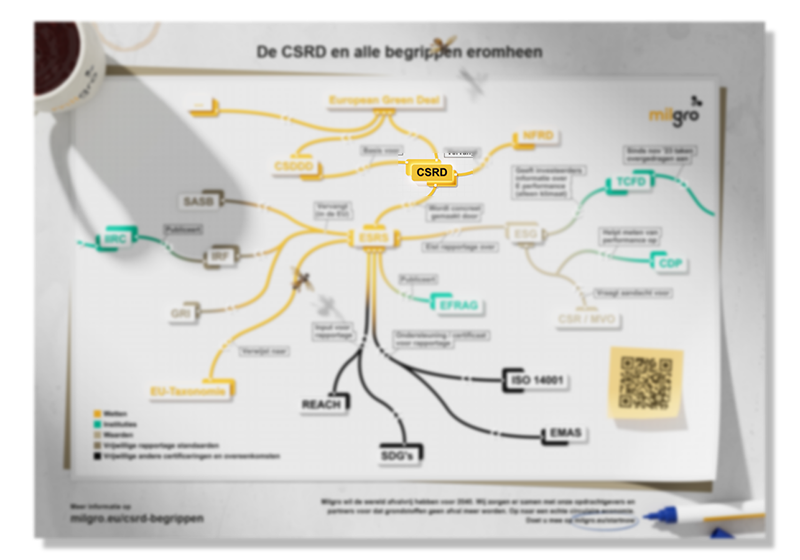The European Green Deal (EGD) is a pioneering European Union action plan designed to become the first climate-neutral continent by 2050, decoupling economic growth from resource use. The EGD includes a wide range of initiatives intended to address environmental challenges while stimulating economic growth. Surrounding the Green Deal are several concepts and legislation that together form the foundation for this green transition. We explore these concepts further in the list below.
CDP (formerly Carbon Disclosure Project)
A platform that encourages businesses and cities to report their environmental impact.
CSRD (Corporate Sustainability Reporting Directive)
Guideline for the mandatory sustainability reporting of large companies. This guideline requires companies to report information on their sustainability performance, including information on environmental, social and employee issues, human rights, anti-corruption and good governance.
CSDD
The CSRD falls under the CSDD; Corporate Sustainability Due Diligence Directive. This directive requires companies to identify and manage sustainability risks, both in their own operations and in their supply chains.
CSR (Corporate Social Responsibility)
Corporate Social Responsibility. This is a voluntary approach for companies to assess and improve their impact on society. Read more about how we can help with this here.
EFRAG (European Financial Reporting Advisory Group)
A European organization providing advice on financial reporting standards and regulations.
EMAS (Eco-Management and Audit Scheme)
European regulation that encourages companies to improve and report on their environmental performance.
ESG (Environmental, Social, and Governance)
ESG is a framework used to assess the extent to which a company pays attention to environmental issues (Environmental), social responsibility (Social) and good governance (Governance). It is increasingly used by investors and shareholders to evaluate a company's sustainable and ethical profile. ESG criteria can cover a wide range of topics, such as the company's impact on climate change, health and safety in the workplace, diversity and inclusion in the workforce, and transparency in operations and reporting.
ESRS (European Sustainability Reporting Standards)
The European Sustainability Reporting Standards (ESRS) form the core of the Corporate Sustainability Reporting Directive (CSRD), a regulatory framework that requires companies within the European Union to report more comprehensively and in greater detail on their sustainability performance. These standards and guidelines are designed to increase the transparency and consistency of sustainability information, allowing stakeholders to make more informed decisions based on companies' environmental, social and governance performance.
EU Taxonomy
A classification system that identifies which investments are considered environmentally sustainable, aimed at facilitating sustainable investments and reducing greenwashing.
GRI (Global Reporting Initiative)
An international independent organization that helps set standards for sustainability reporting by companies. GRI standards are globally accepted guidelines for reporting environmental, social and governance (ESG) performance.
IIRC (International Integrated Reporting Council)
A nonprofit organization developing a framework for integrated reporting.
Integrated Reporting Framework
A framework that guides organizations in integrating sustainability information into their annual reports.
ISO 14001
An international standard for environmental management systems that helps organizations manage and improve their environmental impact.
NFRD (Non-Financial Reporting Directive)
European directive setting requirements for the reporting of non-financial information by large companies. The directive was replaced by CSRD as of 2023.
REACH (Registration, Evaluation, Authorization, and Restriction of Chemicals)
European regulation for the regulation of chemicals.
SASB (Sustainability Accounting Standards Board)
Provides industry-specific standards to help companies report financially-relevant sustainability information.
SDG (Sustainable Development Goals)
A set of 17 goals established by the United Nations to promote sustainable development worldwide by 2030.
TCFD (Task Force on Climate-related Financial Disclosures)
A task force that encourages companies to report climate-related financial information and communicates this information to (potential) investors. In November 2023, these tasks were transferred to the IIRC.
Stay up to date
Stay up to date on all new developments? Follow us on LinkedIn and Instagram or subscribe to our newsletter. Are you curious about what Milgro can do for your operations and waste process? Then get in touch.












